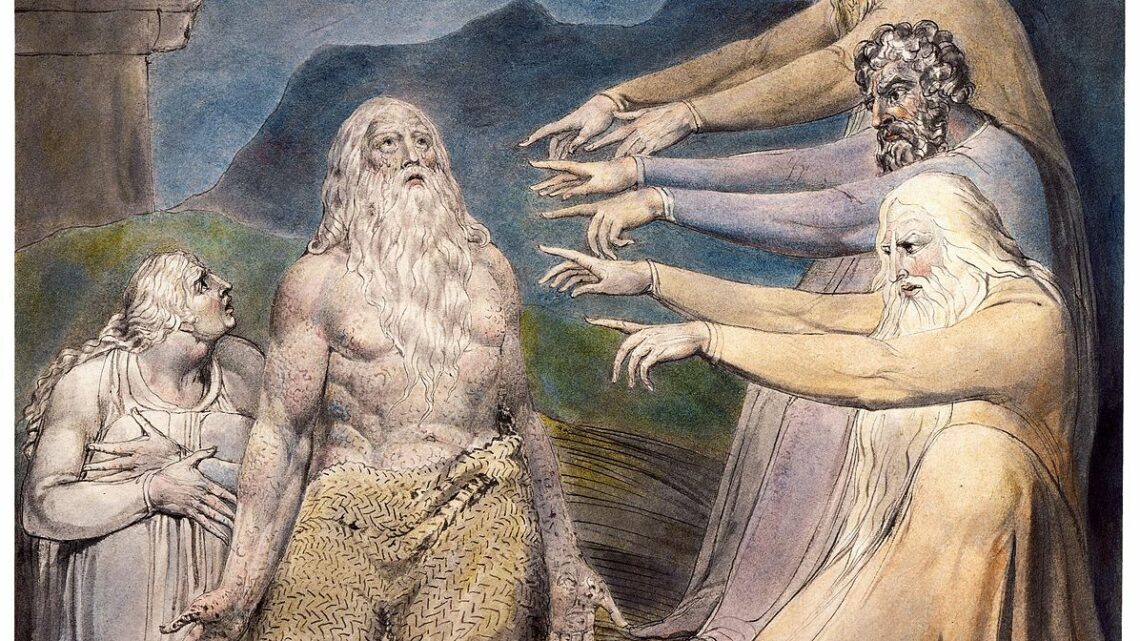We have seen that Job addresses one of the most profound riddles of existence: Why do bad things happen to good people? But the answer, that a cosmic conflict spills over onto people on Earth, brings up a kind of mystery. Why did Satan come with these accusations when the “sons of God came to present themselves before the Lord?” And why did God allow His adversary to afflict Job, and by extension, anyone who chooses to worship Him?
The answer, I suggest, can be found by comparing how the narrator constructs the parallel judgment scenes in Heaven and Earth. While the Heavenly judgment scenes are brief, they precede—and provoke—the more lengthy Earthly ones.
In both Heavenly scenes, Satan crashes the meeting. We know this because the author tells us “sons of God” came to present themselves before the Lord, and Satan also came among them.” (Emphasis mine). The words “and Satan also came” indicate that he is not one of the “sons of God,” but a separate party. I suggest that supplies the answer to both questions above, that is, 1) Satan came uninvited to this meeting because he wants to accuse God in the presence of the sons of God, and 2) God can only refute the accusations by allowing Satan to test his hypothesis. Revelation tells us that the Devil deceived a third of the angels in Heaven with his lies. He tries the same tactics in these scenes.
Satan first says that Job will cease to serve God if he loses his possessions, and second—when Job disproved the first charge—that if Job suffered physical affliction, he would renounce his loyalty to God. It is not enough for God simply to deny the accuser’s charges, because He is the One on trial. If the sons of God are to continue to trust Him, they must see for themselves that the accusations against Him are false. So God must allow Satan to test Job.
In the Heavenly scenes we saw three parties, God, the “sons of God,” and Satan. The earthly scenes mirror this structure. On Earth Job takes the primary role—all the action revolves around him. At the outset the author declares him to be “blameless, upright, fearing God and turning away from evil.” This leaves no doubt that the catastrophes that soon follow cannot be attributed to Job’s character or behavior. The second party consists of Job’s friends, and his wife fills the third party role.
Job’s wife on Earth mirrors the Adversary’s role in Heaven: Satan condemns God for what He has done: showering faithful Job with blessings in return for his worship. Job’s wife condemns God for what He has not done: protecting Job from his trials and afflictions.
Job on Earth mirrors God’s actions in Heaven. Job defends himself against charges that he or his children have done something wrong which merits the punishment he has received. In Heaven, God first contests Satan’s rulership of the earth, and when accused of bribery, permits Satan to afflict Job. Even though Job loses everything, even though his wife says that he should “Curse God and die,” even though he bemoans the fact that he was ever born, Job still trusts in God.
Job’s “comforters” mirror the “Sons of God,” they both fill the role of a jury. The earthly jurors render their verdict. They all blame Job or his children, and they speak at length. This contrasts with the Sons of God in Heaven, because of all the parties on Earth and in Heaven, only the Sons of God never speak. Even witnessing all that happens, and hearing every interchange between God and Satan, they never express an opinion; they do not render their verdict. And this explains the mystery.
It explains why Satan made the accusation against God in the presence of the “sons of God.” And it explains why God allowed Satan to afflict Job. In this case the accusation contains evidence that God indeed has blessed Job, and by claiming that if God takes away these blessings Job will curse him, Satan has said that these material blessings are the only reason for Job’s loyalty.
And the silence of the “sons of God” tells us that in their minds the question remains unresolved.
The reader knows about the scenes in heaven, but Job and those on earth do not. After t Job’s friends on earth fall silent, he engages in a lengthy dialogue with God. In the end, Job realizes that some things are beyond his comprehension as a mere human being. He cannot understand God comprehensively; he must move forward through faith.
Although this can serve as an object lesson for us, it still makes us wonder all the more, “Why include Job in the Bible, since it has no direct connection with any of the other books?” “And why cause it to be perhaps the oldest written book of the Bible? “Or, to use our mural metaphor, how can it be part of the picture, when it is not anywhere in the picture?”
Parallel Structure of Heavenly and Earthly Judgment Scenes: The structure of the narrative mirrors between Heaven and Earth. In Heaven, the three main parties are God, the sons of God, and Satan. On Earth, Job, his wife, and his friends take similar roles.
The Silence of the Sons of God The sons of God in Heaven remain silent, signifying that the question of whether God’s actions are justified is still unresolved in their minds.
The Enigma of Job’s Place in the Bible: This question we will take up in the next blog.









